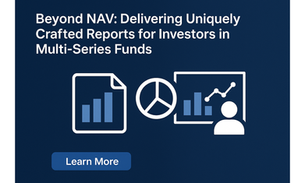Fund Accounting Solutions
When it comes to fund accounting, there's no room for error. Every fund type, be it Hedge, Private Equity, Venture Capital, or others, has its unique accounting intricacies. Fundtec, with its blend of seasoned professionals and sophisticated technology, steps in to unravel these complexities, offering a cohesive accounting solution. Here, we dive into the realm of Fund Accounting through Fund Accountant and why choosing Fundtec can redefine your accounting journey.
Our Fund Accounting Solutions: Tailored to Your Needs
We provide end-to-end fund accounting solutions designed to deliver precision, transparency, and scalability
Let’s explore the specific accounting solutions we provide:
Request Your Fund Accounting Estimate Now
Our Services:
We meticulously designed to support every facet of your fund’s financial operations. By combining expert personnel, robust processes, and modern technology, we deliver transparency, accuracy, and compliance at every step.
We’re proud to offer you the following services, delivered with the highest standards of quality and expertise.
Transaction Processing
Efficiently recording all fund transactions, from individual trade, settlements to capital calls and distributions, ensuring the books are updated on real time basis
Valuation
Conducting independent precise valuation of assets, ensuring accurate and fair representation of fund values across various asset class.
Fee Calculation
Accurately calculating management and performance fees, aligning with fund documents and performance metrics.
Non Trade accruals
Managing accruals for non-trade-related expenses, ensuring all financial obligations are recorded and accounted for accurately.
Key Benefits of Our Fund Accounting Services:
-
Compliance & Risk Management: Ensure adherence to all regulatory requirements and mitigate risks.
-
Transparency & Accuracy: We offer precise reporting and clear communication, ensuring all stakeholders are informed.
-
Scalability: Our services scale with your business, whether you are managing a small fund or a large international portfolio.
-
Cost Efficiency: We help optimize operational costs, making fund management more affordable and efficient.
Find Out How Affordable Accurate Fund Accounting Can Be
Our Technology:
An intelligent, unified platform built to simplify life for fund managers, fund administrators, and funds.
Why Fundtec?
Fundtec delivers tech-enabled, cost-effective fund administration solutions trusted by global investment firms. With deep expertise across hedge funds, private equity, and VC, we combine real-time reporting, scalable infrastructure, and global regulatory compliance to streamline your operations. Our cloud-based platform ensures accurate NAV, investor reporting, and secure data access empowering fund managers to focus on growth while we handle the complexities. Backed by ISO-certified processes and 24/5 global support, Fundtec is your trusted partner in achieving operational excellence and investor transparency.
What you gain from us:
-
50% Faster reporting turnaround time
-
99% Data Accuracy
-
24/5 Customer Support
Services & Solutions Customization Option:
At Fundtec, we understand that every investment operation is unique. That’s why we offer a fully customizable service package and jurisdiction to tailor a modular solution aligned with your needs. Our cloud‑based platform integrates seamlessly with your workflow, enabling you to scale effortlessly and maintain full control, while we deliver precise, technology-driven fund administration.
Our Blogs:
Frequently Asked Questions (FAQs)
- 01
- 02
- 03
- 04
- 05










.png)














